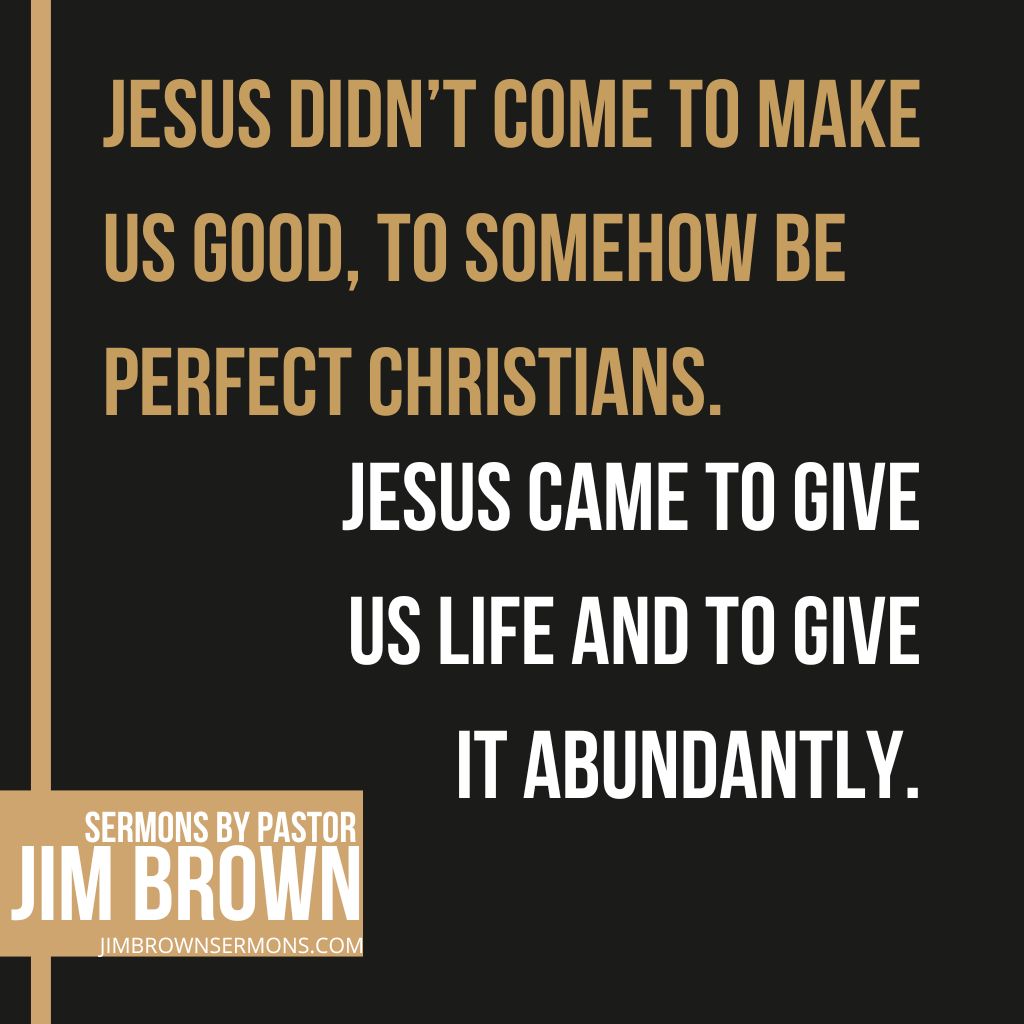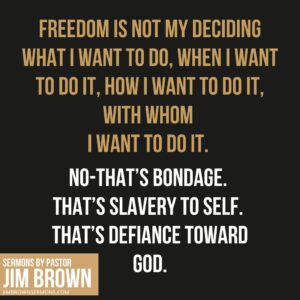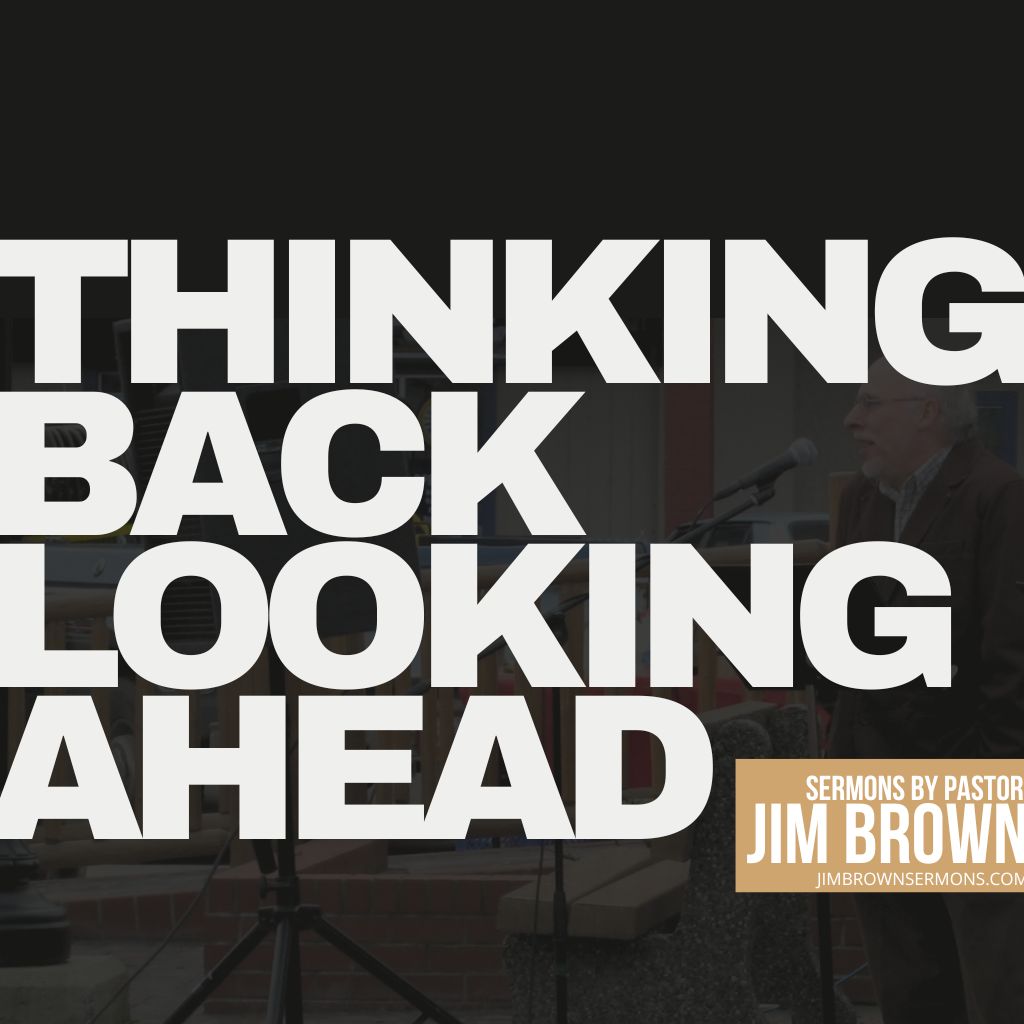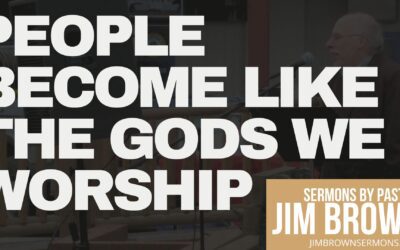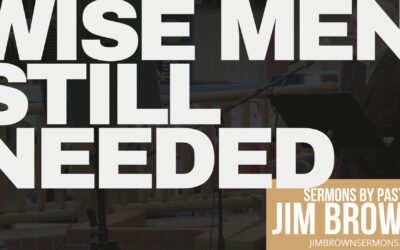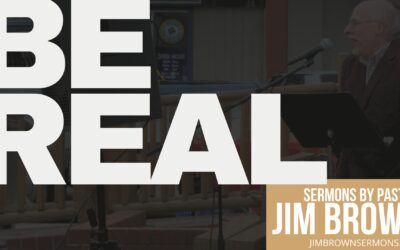APRIL 11, 2025
EP 19: It’s All Downhill From Here | Submit to God for Real Freedom
Prophets of Judah & Exile
Everything looks like it’s falling apart—but maybe that’s exactly where God steps in. This sermon digs deep into what it really means to submit to God, find freedom from sin, and live fully in your identity in Christ. If you’re tired of carrying it all on your own, this message will meet you right where you are.
Sermon Study Resources
Sermon Notes
Your Subtitle Goes Here
Sermon Notes
It’s All Downhill From Here | Submit to God for Real Freedom
Main Scripture: Prophets of Judah & Exile
Speaker: Pastor Jim Brown
Category: Christian Podcasts, Faith and Prayer, Christian Sermons Online
🔑 Main Idea
True freedom begins when we stop living for ourselves and fully submit to God. What was lost in the fall of man—our union with God—is restored in Jesus Christ, the Tree of Life. When we walk in that freedom, we live out our true identity in Christ.
🧭 Old Testament Overview: A Timeline of Rebellion and Redemption
-
The Bible is not just a series of disconnected stories—it is one continuous story of God’s redemptive plan.
-
The Prophets of Judah and the Exile mark a pivotal time in Israel’s history.
-
God continually called His people to return to Him. When they chose rebellion, judgment followed—but always with a promise of grace.
Hebrews 13:8 (NASB)
Jesus Christ is the same yesterday and today, and forever.
🚪 The Story of Ray and Ed: A Picture of Spiritual Bondage
Pastor Jim opens with the historical account of Reynold III, imprisoned by his own appetite. Though his room had no bars, he couldn’t escape because he refused to change.
👉 Just like Ray, we become slaves to our desires when we refuse to submit to God.
Key Truth: “We become just like what we love.”
⚖️ What is Sin? What Did We Lose in the Fall?
-
Sin is separation, not just behavior.
-
The fall brought spiritual death—our soul-spirit was disconnected from God.
Genesis 2:7 (NASB)
Then the Lord God formed man of dust from the ground, and breathed into his nostrils the breath of life; and man became a living being.
Genesis 2:17 (NASB)
But from the tree of the knowledge of good and evil you shall not eat, for on the day that you eat from it you will certainly die.
Romans 5:12 (NLT)
When Adam sinned, sin entered the world. Adam’s sin brought death, so death spread to everyone, for everyone sinned.
Ephesians 2:1 (NLT)
Once you were dead because of your disobedience and your many sins.
🌱 Life in Christ: Restoring What Was Lost
The Bible introduces two types of life:
-
Bios: Physical life
-
Zoe: Spiritual life—union with Christ
To be born again is to be made spiritually alive—restored into relationship with God.
🪞 Freedom From Sin Comes Through Submission to God
-
Our culture defines freedom as autonomy, but biblical freedom is found in submission to God.
-
Jesus modeled perfect submission. He only did what the Father told Him to do.
John 8:31–32 (NASB)
If you continue in My word, then you are truly My disciples; and you will know the truth, and the truth will set you free.
Matthew 4:1–4 (NASB)
Man shall not live on bread alone, but on every word that comes out of the mouth of God.
John 4:34 (NASB)
My food is to do the will of Him who sent Me, and to accomplish His work.
🌳 Jesus Is the Tree of Life
-
The Tree of Knowledge of Good and Evil wasn’t evil—it was forbidden.
-
We live in constant tension, trying to define good and bad ourselves.
-
But Jesus came to reconnect us to the Tree of Life.
John 1:4 (NASB)
In Him was life, and the life was the Light of mankind.
John 6:35 (NASB)
I am the bread of life; the one who comes to Me will not be hungry.
John 11:25 (NASB)
I am the resurrection and the life; the one who believes in Me will live, even if he dies.
🔁 God’s Justice and Grace Throughout the Old Testament
-
Cain and Abel: Cain deserved death, but God showed mercy.
-
The Flood: Judgment came, but so did restoration.
-
Tower of Babel: Man’s defiance, God’s righteous intervention.
-
Abraham: A man of faith and failure—still used by God.
-
Moses and the Law: Moral, civil, and cultural laws shaped God’s people.
-
Judges and Kings: A cycle of rebellion, enslavement, repentance, and deliverance.
💔 The Prophets of Judah: God’s Last Call Before Exile
Prophets like Habakkuk, Jeremiah, Obadiah, and Zephaniah warned of judgment but pointed toward hope.
Isaiah 29:13 (NASB)
These people draw near with their words and honor Me with lip service, but their hearts are far from Me.
💡 Jesus Christ the Same Yesterday, Today, and Forever
The story of Scripture hasn’t changed.
The call hasn’t changed.
The way back to freedom from sin is still the same:
Submit to God. Trust Jesus. Follow Him daily.
Deuteronomy 6:5 (NASB)
You shall love the Lord your God with all your heart and with all your soul and with all your strength.
Matthew 22:37 (NASB)
You shall love the Lord your God with all your heart, and with all your soul, and with all your mind.
🙌 The Church: The New Creation with the Same Expectations
-
The church is the bride of Christ, the focus of this era.
-
We are called to the same standard: love the Lord your God, walk in truth, and live by faith.
Matthew 16:24 (NASB)
If anyone wants to come after Me, he must deny himself, take up his cross, and follow Me.
📌 Takeaways
-
To know the truth, we must first submit to God.
-
Jesus didn’t come to make us “good”—He came to make us alive.
-
Freedom through submission is the key to spiritual growth, not bondage.
📲 Related Topics & Tags
“Christian podcasts”, “faith and prayer”, “sermons on faith”, “trusting God in hard times”, “how to grow in faith”, “Christian sermons online”, “submit to God”, “freedom from sin”, “identity in Christ”, “Jesus Christ the same yesterday today and forever”, “union with Christ”, “born again”, “Old Testament overview”, “Jesus is the Tree of Life”
Bible Verses
Your Subtitle Goes Here
Bible Verses
Hebrews 13:8 (NASB)
Jesus Christ is the same yesterday and today, and forever.
2 Corinthians 4:18 (NASB)
While we look not at the things which are seen, but at the things which are not seen; for the things which are seen are temporal, but the things which are not seen are eternal.
Genesis 2:7 (NASB)
Then the Lord God formed man of dust from the ground, and breathed into his nostrils the breath of life; and man became a living being.
Genesis 2:17 (NASB)
But from the tree of the knowledge of good and evil you shall not eat, for on the day that you eat from it you will certainly die.
Romans 5:12 (NLT)
When Adam sinned, sin entered the world. Adam’s sin brought death, so death spread to everyone, for everyone sinned.
Ephesians 2:1 (NLT)
Once you were dead because of your disobedience and your many sins.
Isaiah 29:13 (NASB)
Then the Lord said, “Because this people approaches Me with their words and honors Me with their lips, but their heart is far away from Me, and their reverence for Me consists of the commandment of men that is taught;
Deuteronomy 6:5 (NASB)
And you shall love the Lord your God with all your heart and with all your soul and with all your strength.
Matthew 22:37 (NASB)
And He said to him, “You shall love the Lord your God with all your heart, and with all your soul, and with all your mind.”
John 8:31–32 (NASB)
So Jesus was saying to those Jews who had believed Him, “If you continue in My word, then you are truly My disciples; and you will know the truth, and the truth will set you free.”
John 4:34 (NASB)
Jesus said to them, “My food is to do the will of Him who sent Me, and to accomplish His work.”
Matthew 4:1–4 (NASB)
Then Jesus was led up by the Spirit into the wilderness to be tempted by the devil. And after He had fasted for forty days and forty nights, He then became hungry. And the tempter came and said to Him, “If You are the Son of God, command that these stones become bread.” But He answered and said, “It is written: ‘Man shall not live on bread alone, but on every word that comes out of the mouth of God.’”
John 1:4 (NASB)
In Him was life, and the life was the Light of mankind.
John 6:35 (NASB)
Jesus said to them, “I am the bread of life; the one who comes to Me will not be hungry, and the one who believes in Me will never be thirsty.”
John 11:25 (NASB)
Jesus said to her, “I am the resurrection and the life; the one who believes in Me will live, even if he dies.”
Matthew 16:24 (NASB)
Then Jesus said to His disciples, “If anyone wants to come after Me, he must deny himself, take up his cross, and follow Me.”
Sermon Slides
Your Subtitle Goes Here


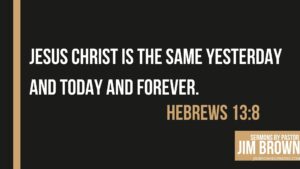


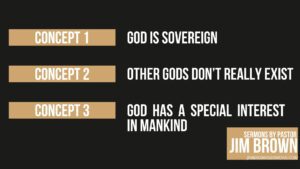
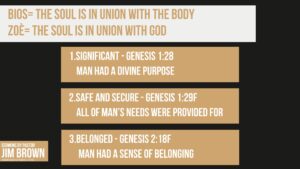
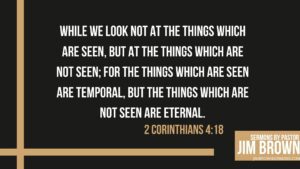

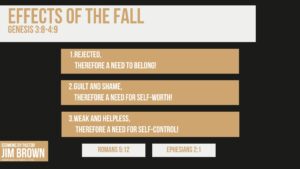

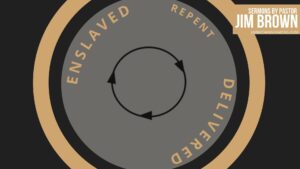
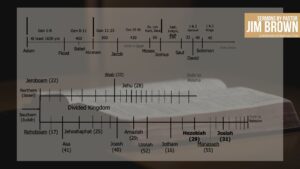

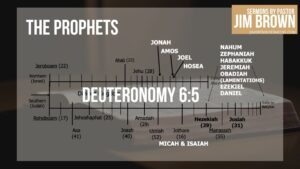
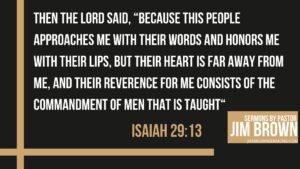
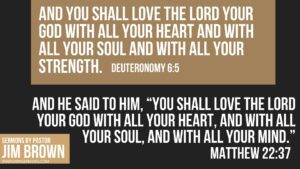
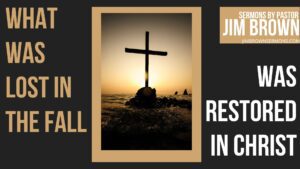

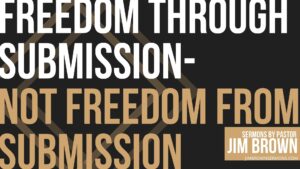
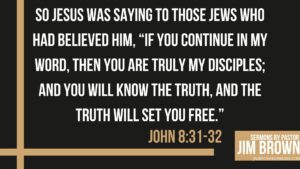


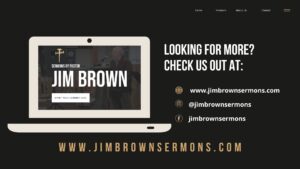
Related Song List
Your Subtitle Goes Here
Recommended Resources
Your Subtitle Goes Here
Recommended Books
Books:
- “The Steps to Freedom in Christ” by Neil T. Anderson
- Description: This biblical guide assists believers in resolving personal and spiritual conflicts, leading to a fruitful life in Christ.
- “Experiencing God: Knowing and Doing the Will of God” by Henry Blackaby and Claude King
- Description: This study emphasizes developing a deeper relationship with God by understanding and doing His will.
- “The Spirit of the Disciplines: Understanding How God Changes Lives” by Dallas Willard
- Description: Willard explores how engaging in spiritual disciplines can lead to a transformed life in Christ.
- “The Pursuit of God” by A.W. Tozer
- Description: A classic work focusing on the human desire for a deeper presence of God.
- “Mere Christianity” by C.S. Lewis
- Description: Lewis provides an exploration of Christian beliefs, including discussions on submission and obedience to God.
- “Glory Days: Trusting the God Who Fights for You” by Max Lucado Amazon+1eBay+1
- Description: Lucado examines the book of Joshua to illustrate how God fights for His people, encouraging trust and submission to His will.
- “The Practice of the Presence of God” by Brother Lawrence
- Description: This work emphasizes continual communion with God through all activities.
Articles and Sermons:
- “Submission Is a Wonderful Weapon” by Abigail Dodds
- Description: An article discussing the power and beauty of submission in the Christian life.
- “Finding Our Identity in Christ” by Timothy Keller
- Description: A sermon exploring how faith shapes our identity in Christ.
- “Free from Indwelling Sin” by R.C. Sproul
- Description: A sermon addressing the believer’s liberation from sin through Christ.
- “Fully Submitted” by Charles Stanley
- Description: A devotional on the importance of complete submission to God’s will.
Videos:
- “Submit to One Another Out of Reverence for Christ” by Joby Martin
- Description: A sermon emphasizing mutual submission among believers as an act of reverence to Christ.
- “Submit to the Word of God” by John Piper
- Description: Piper discusses the importance of submitting to the authority of Scripture.
- “Living a Surrendered Life” by Charles Stanley
- Description: Stanley explores the meaning and benefits of surrendering to God’s will.
Some of these above links in this post maybe affiliate links, and we may earn a small commission at no additional cost to you. These are resources that we would recommend regardless of whether we earn a commission or not. The income generated helps cover website maintenance costs, allowing us to continue sharing sermons, resources, and content with you. We appreciate your support!
Sermon Transcript
Your Subtitle Goes Here
Transcript: It’s All Downhill From Here | Submit To God For Real Freedom
Yeah, it’s all downhill. When you think of it, what does it mean to be all downhill? I was thinking in terms of, boy, if you’re out of gas, you’re hoping it’s all downhill, or it could be going from bad to worse, right? We can look around what’s happening in the world around us and just wonder what is going on? Are things getting better? Are things getting worse? Is this an uphill battle? Are we headed downhill or is it good to be going downhill or whatever? And it’s nothing new for the world to be in turmoil, and it’s amazing that we’ve made it really as long as we have in some ways. I was reading an article and it said that in the year 1334, a 10-year-old boy became the Duke of Belgium, of what, it wasn’t called Belgium then, but what’s now known as Belgium, because could you imagine a political system like this?
His name was Rey iii. He was a very self-absorbed young man, a slave to his own passions, which contributed to the fact that he was quite obese. He had a younger brother named Edward and the two of them fought continuously. So Ray and Edward always at each other. And as they grew up, they ended up heading up opposite political parties and things had gotten heated up so much between the two that they eventually went to war against each other and Ed being the more aggressive one, beat Ray his brother and had him imprisoned in the Newkirk Castle. And interesting thing is in order to avoid any charges of cruelty or anything like that against his brother, ed put his brother Ray in a room, not a cell. And there were no bars on the windows or there were no locks on the doors. He just had all the openings made to a size that only an average person could fit through.
And knowing his brother’s weakness, he had a continuous supply of delicious food coming in. And Ed could honestly say, well, my brother’s not a prisoner. He may leave whenever he so wills for the next 10 years. Ray was willing to forfeit his freedom in order to feed his Tell me to who was he a prisoner studying? The Old Testament is we’ve been going through this. History has proven at least one thing that mankind is willing to forfeit their freedom to feed our destructive appetites in one way or another. Whether it’s just the freedom to do whatever we want, whenever we want, however we want. See until we’re willing to admit that we have weaknesses and to look away from ourself and only look to the one who can deliver us, we will always remain in looking for freedom and it’ll be an ongoing search. Freedom will only be a possibility.
It won’t be a reality until we turn to God. In Hebrews 13, eight, it says, Jesus is the same yesterday, today, and forever. That’s the theme we’ve been following for the last several months now as we’ve been going through the Old Testament that things haven’t changed and Jesus hasn’t changed. And that should be very reassuring for us that when we turn to him, he’s always going to be the same and he’s always going to love us. So we’ve looked at the prophets of the divided Kingdom last week. You see ’em there. We looked at Jonah, Amos, Joel Hosea, and then Micah and Isaiah down here, Hosea and Isaiah down here. So that’s about where they fit in the timeline of the kings of the Northern and Southern kingdom.
There’s also this, they went into exile as you can see where it says Exile to Assyria. And so that’s what we’re picking up today. And the prophets of Judah and the exile Naham who announced the doom of Assyria or Nineveh, there’s Zephaniah, and he was saying, God’s going to start with a clean sweep someday he’s going to start all over. So he was just telling the people that God doesn’t tolerate their injustice forever. There was Habakkuk and he told people that righteous people will always live by faith even during hard times. That hard times isn’t what determines whether we should live by faith or not. We just live by faith if we’re going to be righteous before God. And then Jeremiah, he reminded the people that judgment is necessary against sin in order for God to be a loving just God. Judgment is necessary. But there’s a new covenant coming and then there’s Obadiah.
He told people, you’re going to reap what you sow’s. Pay attention. You’re going to reap what you, it’s coming. And then the Book of Lamentations written by Jeremiah, and really he’s lamenting, he’s crying over Jerusalem that they’re going to be going into captivity. And then once they were in captivity came, Ezekiel, what he tried to show the people is God is still the ruler. You may be taken over, but God is still the ruler here. And then Daniel says, God is sovereign even when you’re under foreign rule. He is in control. He is faithful to his people. So that’s kind of a summary of what these guys all represented, and that happened pretty much during a hundred year period there that those guys were in. So after the exile of the northern Kingdom, the southern kingdom kept on going before they got taken over by Babylon and taken into captivity. So we’ve come to a part in the lessons of what we’ve been looking for so far is the divine, I told you so God’s been warning them, warning them, warning them, warning them, saying, it’s all going to catch up to you. It’s all going to catch up. Turn to me, turn to me while there’s still time. And he’s saying, okay, see what happened. Now you’re taking in captivity. One thing that stands out from the very beginning is that we become just like what we love.
We become just like what we love. We take on the characteristics of that which we worship. And so when we want to know what it is we love, we look at our life and say, okay, what am I like? Because that’s where my true heart is. We’re going to look at the timeline again, starting with the whole thing. The reason is I want to emphasize that the Bible is one story. We have a tendency to break it down into the various stories, the story of Joseph, the story of Daniel, all these different stories, and we don’t see it in its complete flow. And it’s very important to see that the Bible is one continuous story and it’s a story of God. It’s not about you. I’m sorry. Remember Genesis, it was written by Moses. He was taking the people out of exile in Egypt at the time.
And what he wanted to do when he wrote Genesis and preached it to the people, taught it to the people is he wanted to help them understand what the true God was like because they had been exposed to all different types of gods. So he was like kindergarten. He was starting with the very basics. They were exposed to Gods that were like a lot of people, like most people at that time, only worst they played, they drank. They drank too much. They were immoral, they were quite violent. So Moses had to set the record straight and show who the true God is. So he started with Genesis showing them the basics of instruction. It was called the Torah, which means instruction. It says in the beginning, God created the heavens and the earth. Nothing could be clearer than that. He did it. It’s over with. God did it all according to their gods. There were all different types of creation stories, but Moses is setting it straight. That Almighty God just created everything and everything belongs to him.
There were three concepts that are important to understand for the people then and the people now. And the first concept is that God is the magnificent, wonderful, sovereign ruler of everything. He owns it all. A creator at that time was understood to own it. It was his. So God owns it all. He’s not a part of the universe. He created the universe. He’s above and beyond the universe and that we exist for him, not him for us. Concept two. The second one is that other gods don’t really exist. They’re just delusions. They’re things that we’ve promoted to more or less move away from the true God, but they’re not really there. They’re promoted by the Father of lies. The third concept, and this is the most important one for us today, is that God has a special interest in mankind. It says then the Lord, God formed man of the dust of the ground and breathed into his nostrils the breath of life.
And man became a living being. God had a personal interest with man, where he breathed life into him himself. And that life was first of all physical life bios. That’s when our soul and our spirit is in union with our body. So to die physically means the separation of our soul spirit from our body. And then there’s another type of life, and that’s called Zoe. We covered that earlier. And that is when our soul and spirit is in union with God. So our soul spirit within us is in union in two different ways, one with our body and one with God. So it’s sort of the go-between our soul. Spirit is the go-between. So when we die physically, our soul spirit is no longer connected to our body. So for the Christian, being alive means being born again spiritually alive. That’s what born again means.
We’re born a spiritual life connected to God. So the concept in the Bible is to be in union with. So our soul spirit is in union with God or it’s in union with our body. And the idea of death means separation. Okay? So it’s separated from so back to Genesis, man was created in this perfect environment. All his needs were met. He was significant. He had something to do. God bless them. He told them to take over the earth to subdue it, to rule over it. They had a purpose in life there. He was safe and secure. All his needs were met in that all the food was there for him. He didn’t have to work for his food, he just had to go get it. And then he also belonged. He had a family. God says that it’s not good for man to be alone.
He gave him a wife so that they could be together, and then they also belonged to God and had a unique relationship with God at the time. See, Adam wasn’t searching for purpose all over the world. He had it. It was inherent in his existence. So the Bible says that each one of us are a personal creation of God, who cares for us, who looks after us, who wants us to be close to him. To say that while this is spiritual and this is physical, is really a false dichotomy. Everything is under God and God is above all things and ruler of all things. So we can’t separate what’s physical and what’s spiritual now. We need to make sure to understand that God has blended them together. And in second Corinthians four 18, it says, while we look not at the things which are seen, but at things which are not seen for the things which are seen are temporal.
So the things that we see here are temporal, but the things which are not seen are eternal. So the spiritual is actually more of a reality than the physical according to God. So you can imagine now Moses is giving this instruction to the people, and this is challenging them because it’s not the way they grew up, that God is one God, he is almighty. He is over all things. Moses knew. In order for them to have a proper sense of self-worth, they would’ve to see their worth before God and how important they were to him.
So what happens? Why isn’t this easy for us to understand? Well, there’s the fall that happened in Genesis three. And in Genesis it says, for the day you eat from the tree, you shall surely die. Well, they ate from the tree. Did they die physically? No. But spiritually, yes. Their soul spirit was no longer in union with God, so they did die. There was a separation between the inner man and God. They lost Zoe. So the first condition of sin, when we think about sin, the first condition of sin is always going to be broken fellowship with God. That’s what it means to sin. It means that we’re going different direction than God, just like Adam and Eve did. It’s defiance. It’s doing things our own way. It’s death, it’s separation. Their soul wasn’t in union with God, and so they had broken fellowship. And then ever since then, we’ve been plagued by a sense of rejection because we no longer feel significant because we don’t understand God.
We’re not close to him. It’s up to us to draw close to him. We feel guilt and shame. So we look for the world for a sense of worth. We’re weak, we’re helpless. We’re looking for strength, striving for control of our own destinies. And then in Romans five, it says, when Adam sin, sin entered the whole human race. So we’re all suffering with this. In Ephesians, it says, once you were dead doomed forever because of our many sins. You see? So there’s that separation. It’s existent in each one of us as we come into this world. And so as a result, we strive for recognition. We strive for appearance, performance, anything success, anything to give us a sense of value. We don’t realize that these are natural byproducts of a relationship with God. So we keep striving after the wrong thing. We keep trying over and over and over to gain things that are already ours with God. But the thing is, just like throughout history, remember the timeline were people seeking after God or not. So the first emotions expressed by Adam or fear and shame, and we’ve been struggling with those ever since.
Adam and Eve didn’t stay tight with the boss, right? They wandered. They believed a lie, and so do we. Oh, you can’t be close to God. You have to do things on your own. God will never pay attention to you. You can have a better way. You can know it all. So from that point on, after the fall, they were removed from the garden, and God’s process of redemption began to draw people back to himself in different ways. Throughout his work. We’ll see that there’s always a balance of judgment and a balance of grace. The two coexist, but there’s a tension there. Attention that’s very hard for us to discern. But God is perfect. He knows just when to give enough grace and when judgment is necessary, and it even shows as the plot thickens or sickens with Cain and Abel, right? Cain killed Abel, perfect justice would say Cain deserves to die, but in God’s grace, he let him off the hook while he was still punished.
You see, he knew what punishment was necessary, and so God had Cain banished from his family and off to a new land. So the effects of sin were seen early. Sin is very multifaceted. There’s defiance. That’s one way to look at sin is substitution for God’s ways. We saw that with Cain. He decided to do things his way instead of God’s way. Broken fellowship, negative emotions. These are all results in aspects of sin. And then there’s behaviors that are taken, actions that are taken, stealing, cheating, lying, things that are more obvious. Those are sins also. So you can’t just point to sin as a behavior. It’s multifaceted. There’s a lot that goes into sin. So as we go back to the timeline now, we’re going to put the story together on top of that foundation. Okay? Then came Noah and the flood mankind’s inner life had completely deteriorated by this point.
It had really gone downhill. And the sovereign God decided that all of human race needed to be judged for their moral failures. And he destroyed the ancient world by the flood. And you can imagine, as Moses talked about this with the people and he was teaching them, they said, good. Now there’s a fresh start. The people have gotten so bad, we’re going to start all over again and everything will be better. Now what happens next? Well, Noah, old man gets off, the ark gets drunk, and his son ham acts shamefully towards him, right? Things don’t start off so well. Then we get to the Tower of Babel, and one of Noah’s grandsons decides, I know God said that we need to be fruitful and multiply and go all over the earth. Let’s not do that. Let’s gather everybody together and we will be strong and we will be powerful.
We will be more powerful than God. And we’re going to build a tower just to show how great we are, defiance against God again. And God again, judges them, separates them, gave them different languages. They didn’t want to do things God’s way. They rebelled against God. And the confusion of languages was the judgment. Then we get to Abraham, people are dispersed. Abraham’s living out in this booy town, and God gets ahold of him and says, okay, I want to work with you. Will you leave your people? Leave your town and follow me. And Abraham says, I’ll do it. And so by faith, he doesn’t even know where he is going, but he believes God’s leading him. So God leads him out and he goes through a series of tests. Now, Abraham is called the man of faith. And at times he was also a man of failure, big failures.
But regardless of his failures, God’s promise to take care of him and build a mighty nation out of him was maintained. So even though Abraham wasn’t perfect, each time he failed, God was there to bring restoration. And every time that he’s mentioned in the New Testament, Abraham is mentioned positively as a man of faith. So even when he found it difficult to trust God, God didn’t find it difficult to use him. That should be an encouragement for us. He wasn’t looking for perfection from Abraham. He was just looking for him to follow him. And he went through the ultimate test. If you remember, God called him to sacrifice his son, Isaac, and he believed somehow that God said he would use Isaac and make a mighty nation out of him. Abraham didn’t know how he was going to do it because he called him to sacrifice him, and God stopped the process when he saw that Abraham was serious and truly trusting God, he truly trusted him.
From there, Isaac had a son named Jacob. Jacob’s name got changed to Israel, and he had 12 sons. There we get the 12 tribes of Israel. One of those sons was named Joseph. He ushered everybody into Egypt during a famine to save his brothers. So the whole family moves to Egypt and they end up there for like 400 years. And in the process they keep on growing as a nation, even though there’s only 12 of ’em to start, and their families, they become a nation within a nation and they become slaves within that nation. But they are a people group. Just as God promised earlier, they would maintain their nationality even though they were in a foreign land for 400 years. So here, Joseph had moved them out. They multiplied, and then the time of Moses comes and says, okay, it’s time to move out.
Time to move out of Egypt. And you all know the story of Moses, how he delivered ’em through the Red Sea and through all the plagues, and he established the law as they were in the wilderness. Well, what was the law about? Well, the law was there to help them see what it takes to be a nation. A nation needs laws, doesn’t it? Every nation had laws and any of the laws that they had already had were not good laws. One of the ancient codes was the code of rombe, and that was the kind of thing, well, if I were to kill somebody’s daughter, well then you got to go kill their daughter. It wasn’t an eye for an eye kind of thing. It was a really mixed up set of rules. And so God’s saying, no, we’re going to give you some rules that make sense.
Some of those rules were moral laws, so you got to separate ’em out a little bit. Some of them were moral laws. This is right, this is wrong. And if you break a moral law, you’re going to struggle. It’s going to be tough. It really is. You’re going to reap what you sow. And then there were civil laws. Those are more like our traffic laws. They’re in order to keep order in the society. Not everybody can go through an intersection at the same time. So we need to have civil laws. So some of the laws that were established were civil laws, and then there were cultural morays. There’s those things that like when we put our hat on backwards and those things that distinguish us as being something or somebody. So he established those type of laws too, to distinguish the people of Israel as something special. That’s why they have some of the strange laws about how they’re supposed to cut their beard and what they’re supposed to wear in order to help them be distinguished as a people group, just like the gangs do with their ways of distinguishing themselves. So that’s the way the laws worked. And so they lived under those laws for a while. Joshua delivered them into the promised land, and there they got set up. Okay, here they are a nation. They have land, they have a God, they have laws, everything they need to exist.
So for a period of time, the Israelites trusted God. Then they began to shift from the truth again. They ended up believing idols, taking on foreign gods, looking after their own ways, doing what they wanted to do. And God kept sending them people to say, turn around, straighten out. And what would happen is they’d fall into some sort of war and they’d get taken over, and then God would have to deliver ’em. He’d raise up these judges. And so the cycle would go over and over and over again where they would rebel against God. They would be enslaved. They would repent and they would be delivered. So God would raise up these different judges in order to deliver them and for them to wipe out their enemies and get just to start over again. That went on for 300 years with about 15 different judges.
Then they said, we don’t like this method. We want a king. Even though God was supposed to be their king, God says, I will rule you. I’ll be your king. They said, no, we want a human king. So God granted the request, and not many of the kings of Israel were godly kings. They didn’t follow after God. They had a tendency to wander off, and so did the people and the circle continued. Rebel and slave, repent delivered, okay? And God, at this time, this is where the separation of the two kingdoms took place. They had the first king, which was King Saul, the second king, which was David. We all know David, and then we all know Solomon, okay? He was the wealthy one that really set things up. But Solomon didn’t raise his kids so well. And when it came time to succeed him, his one son decided he was going to raise all the taxes on everybody.
And so 10 of the tribes said, no way we’re separating. So we ended up with two northern tribes and then the southern tribes. Is that up there? Yeah. So that’s when the split took place right after Solomon. You can see here, ome took the northern and Rebo took the southern. So that’s what caused the split. So the northern were called Israel. The bottom one was called Judah, and it was prophesied earlier that Jesus would come from the tribe of Judah, and you’ll see that God has protected that tribe throughout history. So that’s where the prophets came in. In order to always reel the people back in, God sent prophets. They preached against the wandering morals of the people, but they also warned of judgment. The prophets were not well received. If you remember, they were often killed and rejected. Isaiah 29 13 summarizes the work of the prophets.
It says, then the Lord said, these people, listen to this. These people draw near with their words and honor me with lip service, but their hearts are far from me. That’s the summary of the message that people draw close to God only with their words, giving him lip service, but their hearts are far from him, and they just follow their rote traditions. Eventually, the Lord did send judgment and on, as you see on the bottom there, they were exiled to Babylon. The Southern kingdom went to Babylon, the northern kingdom, the Syrians. There was about a hundred year difference. There was a hundred years later that the Southern kingdom went, and you would think over that a hundred year period, they’d see what happened to the northern kingdom and repent. But they continued to do their own thing.
So that’s when the original temple was destroyed and they were in exile. And while they were in exile to Babylon, that’s when they were first called Jews because most of the people were from Judah, the tribe of Judah. That exile lasted about 70 years, and during that time, Daniel and Ezekiel were the prophets. And also towards the end of that time, the people were repenting slowly but surely and slowly trickled back and settled around Jerusalem. So all, although the message was the same throughout this history, this brief history of the Old Testament that I just gave you, Jesus quoted from Deuteronomy six, five, and this was recorded in the book of Matthew 22. It says, Jesus says, you must love the Lord your God with all your heart, all your soul, and all your mind. See, love is expressed by trusting God, believing that he’s good, believing that he loves you, believing that his ways are best. That’s what it means to love God with all your heart, all your soul, all your strength. The bottom line of the gospel, the simplest way to describe it, is trust Jesus.
Trust Jesus with everything. Everything. Not just for eternity, but every aspect of life. So what’s happened is go all the way back to Genesis. The wrong tree has become the central focus, right? There were two trees in the garden, the tree of the knowledge of good and evil, and the tree of life. They chose the tree of the knowledge of good and evil. Remember, that was not a sinister tree. God has knowledge of good and evil doesn’t He did. Then it wasn’t a bad tree, it was a forbidden tree, forbidden tree. It was off limits, and there are still things that are off limits for our own good, but they didn’t believe God. They didn’t have faith. And so they took of the tree that was forbidden, and God says, don’t do that. And he still does that today. He knows what’s good for us, and we determine to do things our own way and to make our own choices.
Then we try to move from one side of the tree to the other side. We say, okay, what’s good and what’s bad? And we start making our lists. Well, this is good and this is bad. This is good and this is good, and that’s bad. And we start dividing things up, and then we run into a TV show that was on the bad list, but we happen to like it a little bit more. So we try to push it over to the good side or maybe some other things that in materialism and all the cultural things that we can get into, we start playing games trying to say, well, if we split it a little bit differently, we can move those lines. And maybe if I take something that, well, yeah, I know it’s good, but if I move it over to the bad side and try to refrain from doing that, I can do this instead.
And so it’s over and over and over again, just playing games with a tree of the knowledge of good and evil. We go back and forth, back and forth, trying to be good, trying not to be bad. Sometimes we just resign ourselves to saying, Hey, I’m just a no good lousy sinner. I’m just going to be bad. And things just keep getting worse. You can’t even define bad anymore. You can’t even define good. The lines just seem to move around. We end up stepping on each other’s toes, tension and disunity results. Are we hopelessly stuck in this cycle?
What’s wrong with this picture? Well, what was lost in the fall was restored in Christ. What did Jesus come to do? He came to restore Zoe. Remember, it’s all about life in Christ. Keep your focus on Jesus. That’s where the life is. This is the tree of life. As long as we stay focused on Christ, we won’t be struggling with what’s right and what’s wrong. He’ll guide us now. Yeah, there’s moral standards and there’s still judgment for breaking those moral standards, but don’t focus on what we can get away with. Focus on this. That’s where freedom is. Jesus came to die for our sins and to give us life, to give us hope. Jesus was born spiritually alive. He had union with God, and he never lost spiritual life. It’s always been there. He is the tree of life. So what was lost in the fall was restored in Christ.
In Book of John, it says that in him was the life, and that life was the light of men. Jesus said, I am the bread of life. He said, I am the resurrection then a life. He who believes in me shall never die. See, Jesus didn’t come to make us good to somehow be perfect Christians. Jesus came to give us life and to give it abundantly. But being a loving God, justice must be carried out against sin, right? Would God be loving if I were to hurt somebody, to offend somebody to do harm to somebody and God were to say, oh, it’s okay. I forgive it. Is that just is that fair? No. Sin has got to be judged.
You see, sin is debt and all debts need to be paid. Someone has got to pay. It gets paid through submission to the king. He paid the price, didn’t he? Jesus paid the price for our sins. See, we often think, I want to be free from submission. I don’t need to submit to anybody. I want to be free. No, it’s freedom through submission. That’s the way it works. Submission is within the very nature of God. What do I mean by that? Well, Jesus said that he does nothing except what the Father tells him to do. He was fully submitted to the father’s will. In John eight, it says, then he’s talking to his disciples that if you continue in my word, then you’ll be my disciples, and you will know the truth, and the truth will set you free. He’s saying, if you submit to me you have to be mine, then you’ll know the truth and the truth will set you free. But if you’re not submitting to him, you won’t know the truth and you won’t be free. You can’t say, well, let me know what the truth is, and then I’ll decide whether I’ll submit to it. Now he says, submit to him. Then you’ll know the truth and then you’ll be free. So it’s freedom through submission, not freedom from submission. It’s not freedom versus submission. You can’t have freedom without submitting. If you don’t submit, you won’t know the truth and then you’re going to end up just barking up the wrong tree.
You’re going to try to figure it all out. What’s right, what’s wrong? What can I get away with? What can’t I get away with? How come life is so hard? See, we have something to learn about freedom, a lot to learn about freedom. Freedom is not what our culture tells us it is freedom’s not my deciding what I want to do, when I want to do it, how I want to do it, with whom I want to do it. Now, according to the Bible, that’s bondage, that’s slavery to self, that’s slavery to sin. That’s defiance towards God. Jesus was the most free person that ever lived lift. We will only experience freedom when we follow His example again to his disciples in John four, he said, my food, his food get this is to do the will of the one who sent him to accomplish his work.
Jesus was living in full submission to the Father. Here’s another one in Matthew four. It says, Jesus was led by the Spirit, so he was following the spirit of God, so he was submitting himself to the Holy Spirit. Now, he was living in submission to the Spirit. He was led into the wilderness in order to be tempted by the devil. Now that’s submission. And after 40 days and 40 nights without eating of fasting, he became hungry. Could you imagine? Became hungry, famished. I would if I was even still alive. And then tempter came to him and said, if you’re the Son of God, command these stones to become bread. Right? He was hungry. He could have done that, but he answered, man shall not live by bread alone, but on every word that proceeds out of the mouth of God. In other words, my paraphrase is this, you know what?
I’m not going to eat until the father tells me the fast is over. That’s what he said. I’m not even going to eat until the father tells me I’ll do exactly what the Father tells me to do. Jesus lived in submission to the Father, and he calls us to live in submission to him. When you rebel and won’t come under submission, you are saying to God, I don’t like the way you are. God, that’s the way you are. You live under submission, but I’m not going to. I don’t like that. So you just have your way, and he lets us do that, but then we come under judgment. See, Jesus is the king of kings, and he’s in the process of bringing everything under his subjection. He is the king. He is on the throne. Things are not spinning out of control.
His main purpose in this era is to build the church, his church, and to free us from self-destruction. He’s the bondage breaker. And just like we see in the Old Testament, he treats the church the same way. He’s interested in serious followers, people who love him with all their heart, all their soul, all their strength, people who love their neighbor as themselves. That’s what he’s looking for in the church. So the church is the new creation of the old covenant. Same expectations of what we saw throughout history apply to us to follow him, to love him, to put ourself aside. And then his promises of deliverance are true. We experienced them in Matthew 1624. Jesus said to his disciples, if anyone wants to be my follower, you must put aside your selfish ambitions, shoulder your cross and follow me. See, Jesus is the same yesterday, today, and forever.
He wasn’t the God of the Old Testament, and now he’s the God of the New Testament. He’s all one God, and walking with him is the same as it’s always been. It’s a love relationship with him in the center. It’s not about you. It’s all about Jesus. Israel is no longer in the center of his attention. The church is, he loves the church. He calls the church his bride, but he hasn’t changed his mind about those who follow him. He’s looking for true followers. So the question is today, to whom are you a slave? Are you free? Who are you in bondage to? Who’s your master?
Are your self-absorbed passions, your master, or is Jesus your master? We have a great and wonderful savior we can trust. Let’s pray. Heavenly Father, we thank you that you have not kept yourself hidden from us, that you have revealed yourself to us in the person of Jesus Christ. And still we struggle. Lord, I don’t think we struggle with believing of who he is. We struggle, Lord, with letting go and trusting you. We all want to be our own God, and that doesn’t work. Help us, Lord, today to see just one more area of our life that we’re holding onto, that we’re not trusting you with, that we can say it’s all yours. Jesus, take it away. I trust you. I know you love me. I know you have what’s best for me. We thank you, Lord, that you don’t expect us to be perfect. Only Jesus is perfect. You just want us to follow you, and you lead the way with a bright shining light from the way of the cross. In the name of Jesus. Amen. Amen.
Original Sermon Date: January 8, 2006
© 2025 Sermons by Pastor Jim Brown www.jimbrownsermons.com All rights reserved.
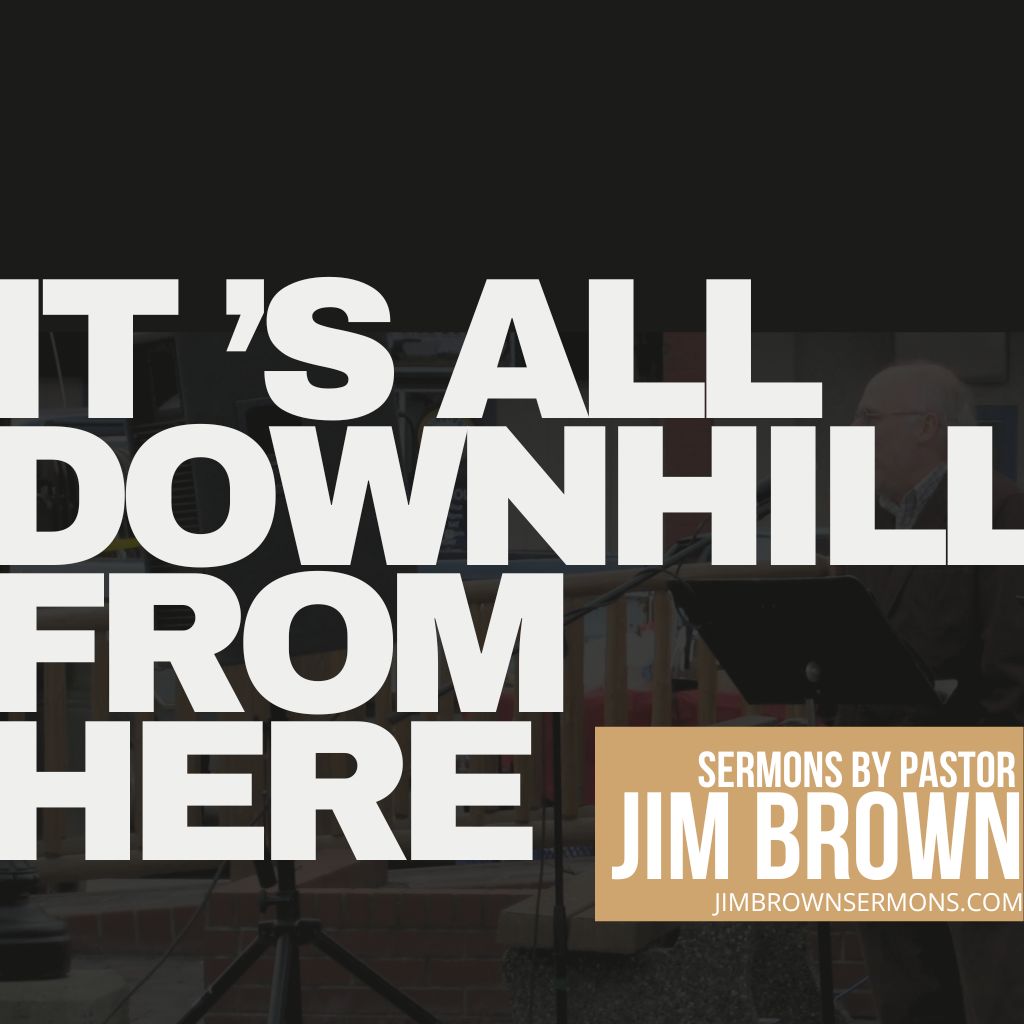
It’s All Downhill From Here | Submit To God For Real Freedom
Prophets of Judah and Exile
Gas runs out. Circumstances spiral. Life feels like it’s all downhill—and maybe, just maybe, that’s the best place to be. Not because things are falling apart, but because God finally has our full attention. When we reach the end of ourselves, we finally have room to discover the beginning of true freedom. And the way to that freedom? It starts when we submit to God.
This sermon takes us on a journey through Scripture—from Genesis to the prophets, from broken covenants to restoration in Christ. It’s not just a message about ancient history. It’s about your life, right now. It’s about learning how to live free by laying down the illusion of control and embracing your identity in Christ.
When We Submit to God, We Find Real Freedom
We often think of submission as weakness. Giving up. Letting go of our rights. But God flips the script. In His kingdom, submission to God isn’t bondage—it’s liberation. It’s how we walk in strength, peace, and freedom from sin. It’s where we begin to experience the full life Jesus promised.
Our culture tells us to define our own truth, chase independence, and never back down. But Scripture tells another story. As Pastor Jim shared in this sermon, the real tragedy of humanity isn’t weakness—it’s stubbornness. We keep trying to do things our way, even when the road leads nowhere.
The Bible shows us over and over again that it is indeed all downhill from here when we ignore God. But when we finally turn around and surrender? That’s where redemption begins.
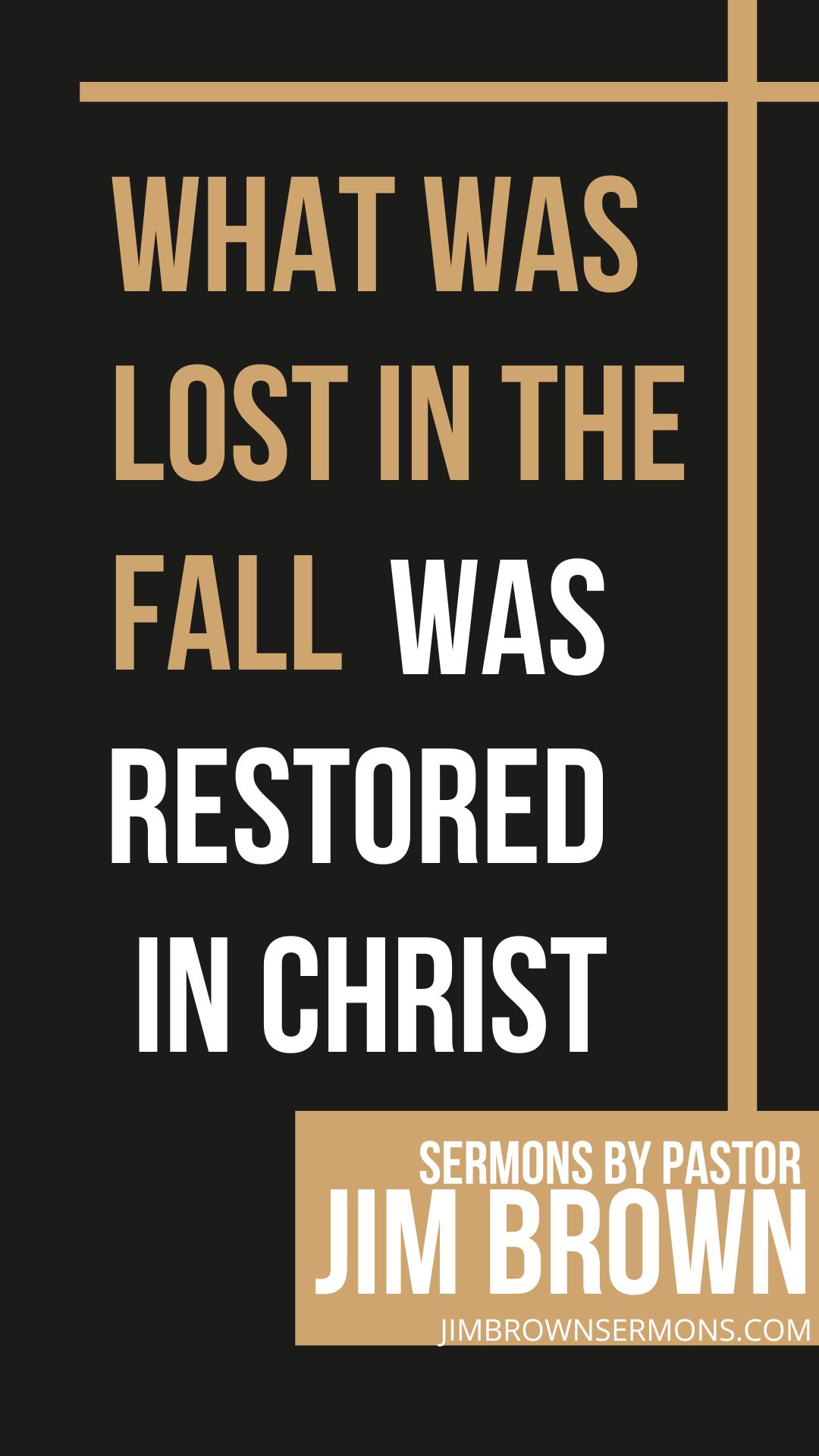
Identity in Christ: Restoring What Was Lost
From the very beginning, God created us to live in union with Him. Genesis 2:7 tells us that God breathed life into man—Zoe life, spiritual life. This union was personal and powerful. But sin entered the picture, and that relationship was fractured.
Sin is not just bad behavior. It’s separation. It’s disconnection from God’s presence, His design, and His truth. That’s what Adam and Eve lost when they ate from the forbidden tree. Their eyes were opened to good and evil, but their hearts were closed to God.
Since that moment, humanity has been chasing identity apart from God. But our identity in Christ restores what was lost. When we are born again, our spirit is brought back into union with God. That’s real life. That’s Zoe.
Romans 5:12 and Ephesians 2:1 remind us of our state before Christ: dead in sin, separated, searching. But through Jesus, we are restored. We don’t earn that life—we receive it through submission.
The Old Testament Overview: One Story, One God
Many people approach the Bible as a collection of separate stories, but it is one unified story. From Genesis to the prophets, we see a cycle: God calls, people rebel, judgment comes, grace follows. Repeat.
The Old Testament overview in this sermon highlights how God consistently reaches out to His people, even when they refuse to listen. The prophets of Judah, especially during the exile, spoke hard truths. They warned of coming judgment but also pointed to hope.
We see this pattern in the stories of Cain and Abel, Noah, Babel, Abraham, Moses, the judges, and the kings. Again and again, people reject God’s ways, and again and again, God offers a path back. But that path always begins with repentance—with turning around and submitting.
Isaiah 29:13 paints a clear picture of the problem: people honored God with their lips but not their hearts. That problem didn’t end in ancient Israel. It lives on in us today.
Love the Lord Your God with All Your Heart
Jesus quoted Deuteronomy 6:5 when asked about the greatest commandment: “You shall love the Lord your God with all your heart, soul, and strength.”
Loving God means trusting Him. Believing He’s good. Following His lead. It’s not about perfect performance. It’s about posture—a surrendered heart that chooses to obey even when it’s hard.
Jesus said in Matthew 22:37, “Love the Lord your God with all your heart, and with all your soul, and with all your mind.”
The message hasn’t changed. Neither has the call. We were made for a love relationship with our Creator. We are at our best when we’re close to Him.
Freedom From Sin Through Union with Christ
When we focus on rules, on being good enough or avoiding bad things, we fall into a trap—the same trap Adam and Eve fell into: relying on our own reasoning instead of God’s voice. We end up asking, “How close can I get to the line without falling off?” instead of, “How close can I stay to Jesus?”
But Jesus is the Tree of Life. He is where the life is. He said in:
-
John 1:4: “In Him was life, and the life was the Light of mankind.”
-
John 6:35: “I am the bread of life.”
-
John 11:25: “I am the resurrection and the life.”
Freedom doesn’t come from managing our sin. It comes from walking in union with Christ, from staying connected to Him in everyday life.
Jesus Christ the Same Yesterday, Today, and Forever
Hebrews 13:8 reminds us: “Jesus Christ is the same yesterday and today, and forever.”
He has not changed. The way to life has not changed. The struggles are the same, and so is the solution.
Submission isn’t a trendy word. But it’s the heartbeat of a Christ-centered life. It’s what Jesus Himself modeled. He submitted to the will of the Father at every step.
Matthew 4:1–4 shows Jesus being led by the Spirit into the wilderness to be tempted. Even after 40 days of fasting, He refused to move until the Father said so.
That’s the freedom that comes from submission. It’s not passive. It’s powerful.
Submit to God and You Will Know the Truth
John 8:31–32 gives us the promise: “If you continue in My word, then you are truly My disciples; and you will know the truth, and the truth will set you free.”
We often want the truth first so we can decide whether or not to obey. But God says, submit first. Then you’ll see. Then you’ll understand. Then you’ll be free.
Freedom through submission isn’t a contradiction. It’s the design. And it’s how Jesus lived every moment of His life.
Who Is Your Master?
At the end of the day, we are all submitting to something. Whether it’s fear, pride, performance, addiction, or ambition, something rules our lives. Jesus offers us a better Master—Himself.
In Matthew 16:24, He says: “If anyone wants to come after Me, he must deny himself, take up his cross, and follow Me.”
It’s not about being perfect. It’s about being real. Being honest about where we’ve tried to be in control. And laying that down at the feet of the One who already carried the cross for us.
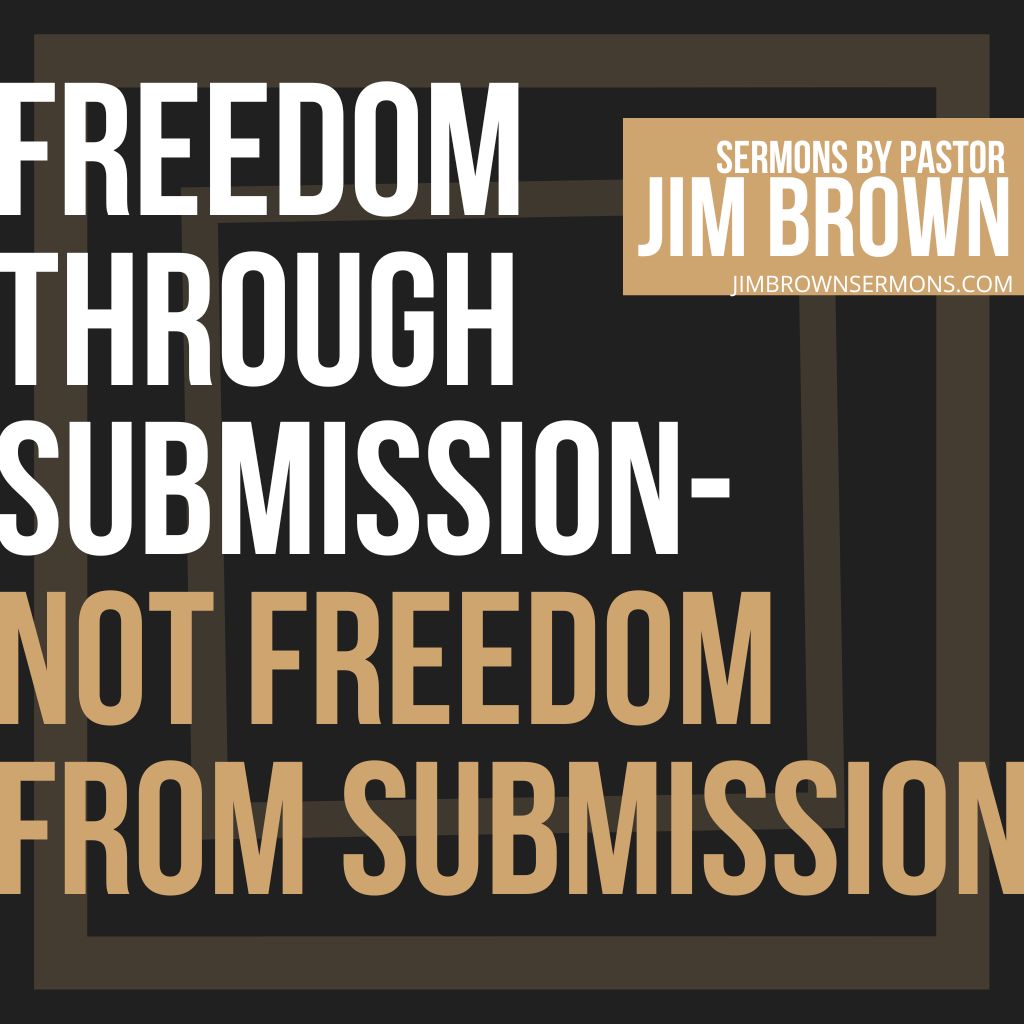
We’re not so different from the people in these stories. We wander. We rationalize. We want control. But God’s message is timeless:
Look back at how He’s cared for you.
Look ahead with hope, knowing He’s still in control.
Trust in God’s love, which never fails.
“He personally carried away our sins in his own body on the cross so that we can be dead to sin and live for what is right. You have been healed by his wounds.” —1 Peter 2:24 (NLT)
This is the good news. This is the heart of God.
Final Thoughts: Submit to God for Real Freedom
The same God who led Israel through exile, the same Jesus who fasted in the wilderness, is the One calling you today. If it feels like everything is going downhill, maybe that’s okay. Because when we finally stop trying to fix ourselves, we give God room to move.
It’s All Downhill From Here | Submit to God for Real Freedom is not just a sermon title—it’s a way of life. One where we stop striving and start surrendering. Where we trade rebellion for relationship. Where we stop chasing control and start trusting Christ.
This is how we grow in faith. This is how we become spiritually alive. This is how we experience freedom from sin, walk in our identity in Christ, and live with purpose even in the hardest times.
Because Jesus didn’t come to make us good. He came to make us alive.
#SubmitToGod #FreedomFromSin #IdentityInChrist #JesusChristTheSameYesterdayTodayAndForever #OldTestamentOverview #ChristianPodcasts #FaithAndPrayer #HowToGrowInFaith #ChristianSermonsOnline #UnionWithChrist #BornAgain #LoveTheLordYourGod #JesusIsTheTreeOfLife
Original Sermon Date: January 8, 2006
Thank you for visiting! Some of the links in this post are affiliate links, and we may earn a small commission at no additional cost to you. The income generated helps cover website maintenance costs, allowing us to continue sharing sermons, resources, and content with you. We appreciate your support!
© 2025 Sermons by Pastor Jim Brown www.jimbrownsermons.com All rights reserved.
More Resources and Sermons
If you’re looking to dive deeper into Christian podcasts, faith and prayer, and sermons on faith, check out our other resources on the website. Learn more about how to grow in faith, trusting God in hard times, and Christian sermons online to strengthen your walk with God.
CHECK OUT LAST WEEK’S SERMON
THINKING BACK LOOKING AHEAD | God’s Love Never Fails
If you’re looking to dive deeper into Christian podcasts, faith and prayer, and sermons on faith, check out our other resources on the website. Learn more about how to grow in faith, trusting God in hard times, and Christian sermons online to strengthen your walk with God.
RECENT SERMONS
EP 8: PEOPLE BECOME LIKE THE GODS WE WORSHIP | Idolatry Defined
Discover the meaning of worship, false idolatry defined, and the foundations of creationism in this engaging and insightful sermon.
EP 7: WHAT WOULD YOU EXPECT | A Christmas Sermon
Experience the hope of Jesus in this Christmas Sermon. Discover the joy of turning to God, being born again, and finding eternal peace in Him.
EP 6: WISE MEN STILL NEEDED | Seeking The God Of Wisdom
Discover the God of Wisdom and the life-changing power of the fear of the Lord. Gain timeless insights from the wisdom books of the Bible today!
EP 5: BE REAL | Embracing Biblical Wisdom
Discover Faith that pleases God. Embrace Biblical faith and learn the power of walking by faith daily. Tune in for inspiration and spiritual growth.
EP 4: STILL CRAZY AFTER ALL THESE YEARS | God’s Promises In The Bible
Discover Faith that pleases God. Embrace Biblical faith and learn the power of walking by faith daily. Tune in for inspiration and spiritual growth.
EP 3: FAITH THAT PLEASES GOD | Walking By Faith
Discover Faith that pleases God. Embrace Biblical faith and learn the power of walking by faith daily. Tune in for inspiration and spiritual growth.
